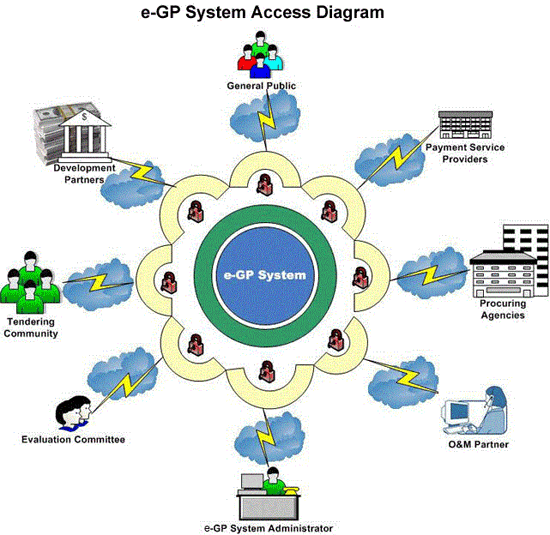About e-Government Procurement (e-GP) System
National e-Government Procurement (e-GP) portal (i.e., https://www.eprocure.gov.bd) of the Government of the Peoples Republic of Bangladesh is developed, owned, being operated, and maintained by the Central Procurement Technical Unit (CPTU), IME Division of Ministry of Planning. The e-GP system provides an online platform to carry out the all-procurement activities by the Public Agencies – Procuring Agencies (PAs) and Procuring Entities (PEs).
The e-GP system is a single web portal from where and through which PAs and PEs will be able to perform their procurement-related activities using a dedicated secured web-based dashboard. It is hosted in the e-GP Data Center at CPTU. The web portal is accessible by the PAs and PEs through the internet for their use.
This complete e-GP solution introduced under the Public Procurement Reform (PPR) Program is being supported by the World Bank and gradually used by all government organizations. This online platform also helps them ensure equal access to the Bidders/Tenderers and also ensures efficiency, transparency, and accountability in the public procurement process in Bangladesh.

The e-GP system has been implemented in two phases:
- e-Tendering System: Covering complete tendering processes such as centralized user registration, preparation of Annual Procurement Plan (APP), preparation of Bid\Tender document, preparation of Bids/Tenders, invitation of Tenders, sale of Tender Documents (eTD), conducting online pre-bid meeting, collection of bid\Tender security, on-line Bid\Tender submission, Bid opening & evaluation, negotiations (where applicable), and contract awards.
- e-Contract Management System (e-CMS): Covering complete contract Management processes, such as preparation of work plan and its submission, defining milestone, tracking and monitoring progress, generating reports, performing quality checks, generating running bills, vendor rating and generating completion certificate.
e-Tendering and eCMS (e-GP) is launched successfully on a pilot basis and eventually being rolled out to all PEs of four Sectoral Agencies, namely Bangladesh Water Development Board (BWDB), Local Government Engineering Department (LGED), Rural Electricity Board (REB), and Roads and Highways Department (RHD). It is now expanding to all government procuring entities dealing with public procurement.
Expression of Interest (EOI)
When tenders for contracts are advertised, interested parties are generally directed to an online portal. A summary of the tender is given, and prospective tenderers are invited to register an initial EOI – Expression of Interest.
What is the purpose of an EOI?
What Does Expression of Interest (EOI) Mean? In a nutshell, an expression of interest is an informal declaration that a buyer, whether strategic or financial, would like to purchase a business. The expression of interest will also provide the seller with a range of possible buying prices.
The issue many prospective tenderers face at this point is that they are not sure whether they are interested in the tender or not. In order to be able to establish if the tender is of interest to them, they need to access the contract documentation. But they can’t access the contract documentation until they have expressed interest.
This is not a problem. It is possible to register an initial EOI – Expression of Interest, access the contract documents, assess the tender, decide not to proceed, and withdraw the initial EOI – Expression of Interest. This can all be done without obligation, and the initial EOI – Expression of Interest can be withdrawn in such a way as to be able to opt back in at a later stage.
Being able to do this is an essential part of the bid / no-bid decision-making process. Without the full contract documentation, it may be impossible to make an informed decision.
Furthermore, the next stage in the online tendering process is to confirm your intention to respond. As with registering an initial EOI – Initial Expression of Interest – this can be withdrawn at a later stage. It is important of course to be fair with the tendering organization and to withdraw as soon as you know. It is important for them, in the interests of running a professional tendering process, to know how many bids to expect.
As with all tender-related activity, it is important to act sooner rather than later. The clock is always ticking.
